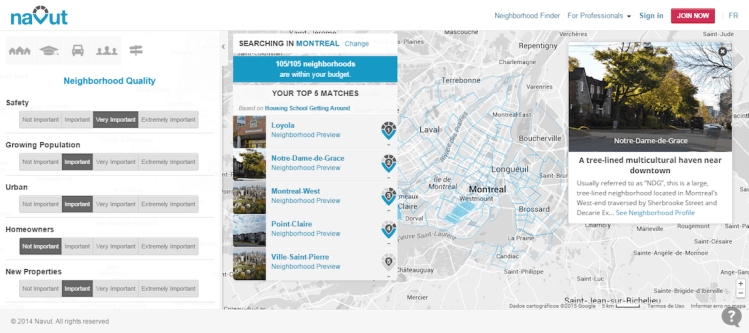Suppose you’re moving to another city that you barely know.
Of course, you have to decide which neighborhood will be yours. A website from Canada, which will add U.S. data by the end of this year, thinks it can help.
Called Navut (nah-voot), the site is designed specifically for inter-city movement, according to CEO and founder Mauro Repacci. A mobile app version is in the works.
In 2013, he launched his Montreal-based company, which has since raised a million dollars, following a move to Canada from Brazil in 2007. The neighborhood he landed in, he said, was wrong for him — no amenities, far from public transportation, and overpriced.
In the Navut site, users are asked to rank their top decision factors, like housing costs. The most popular drivers are the quality of schools, safety of neighborhoods, and length of the commute. The user can then drill down to the neighborhood level, and, after that, connect with site-listed realtors and property managers for those areas.
The platform currently has info on about a thousand neighborhoods in Canada, covering the seven cities that Repacci said account for three-quarters of relocations there.
There’s access to data on the quality of public and private schools from the education ministry in each province, public transportation from Google Maps, census-informed demographics like numbers of families or singles in a neighborhood, and houses and apartments from a growing inventory of realtors and property managers.
Local police provide info on neighborhood safety, and users can rate and write reviews about neighborhood profiles. An upcoming tool will allow users to compare typical job listings for different cities.
Property managers and realtors pay a referral fee for every incoming inquiry, even if it doesn’t result in a purchase or rental.
Realtors can target people based on the neighborhood they want or the language they prefer. The company said this is used most often by realtors who speak several languages, and doesn’t allow them to accept only those clients.
Repacci also noted that the platform is “generating a lot of info, like what neighborhoods are trendy and what people are looking for,” which he expects to monetize.
Each year, about four million people move to or within Canada, half of those to a new city. That number of movers is nearly ten times larger in the U.S., with about 16 percent moving to a new area, per the Census. Americans have a 30 percent higher mobility than Canadians, Repacci said, apparently because of a greater range of opportunities and a lot more cities.
Competing services like Realtor.com or Zillow, he said, are “all designed for people who know where they want to live.” Services like Neighborhood Scout can locate neighborhoods via data, but without the decision factors that Navut offers.
The company reports that about 250,000 users have signed up during the beta phase — 70 percent in Canada, 30 percent outside — and that the user base is growing by 20 percent monthly.
The U.S. launch will initially be focused on cities with the largest immigrant populations, he said, since they tend to move more often.
VentureBeat's mission is to be a digital town square for technical decision-makers to gain knowledge about transformative enterprise technology and transact. Learn More

